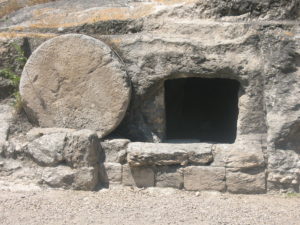I had never felt more alone or lonely than my junior year of college. I was studying in Germany at a time which predates email, social media and even cell phones. I was literally disconnected from my friends, family and all that provided me comfort.
It was also during this time the first Gulf War occurred. There were protests in my German university town, I was spat upon going to class and painted on the garbage dumpster in the courtyard of my dormitory was, “Amis go home” (Amis being short for Americans). It was unsettling some days and frightening on others. On top of the usual culture shock from living overseas, I felt shaken by the anger I felt around me.
During this time, I still went to Mass on Sundays, but as I felt more and more unsettled, I went to Mass more frequently until I was going almost daily. The liturgy put me back on solid footing. The structure, the prayers, the format were all known to me. And although it took me a while to be able to fully participate in German, I could always walk up to the alter during communion, hold out my hands and say Amen. It made me feel as if I was part of something larger than myself.
The most basic definition of liturgy is the order of corporate worship services. It is a time to join as a community in praise to God. We learn about Christ’s teaching and how to engage with our faith to deepen our relationship with God and each other.
As I sat in Mass this past Sunday, I realized I didn’t need liturgy. I needed ministry. In the Greek language used in the New Testament, ministry always centers on acts of service to others. It is listening to the needs of others and being the hands and feet of God to attend to those needs. Christ calls us to watch over, lift up, and strengthen those around us.
While liturgy is ritualistic in nature, Pope Francis, in an apostolic letter, Desiderio Desideravi, stated that “a celebration that does not evangelize is not authentic.” And he has cautioned against “putting the rite before what it expresses”. My interpretation, Pope Francis is telling us to not just go through the motions or follow the rules because the institutional church says so. We need to approach liturgy with a sense of wonder and awe. We need to make it come alive and most importantly, meet the needs of the people gathered. In other words, minister through the liturgy.
Liturgy provides the comfort of the known and is grounding. Ministry helps us navigate what is unknown and provides companionship as we walk forward into uncharted waters. We need both.
I find my scale is tipping toward needing more ministry. Not only do I need more ministry for myself, but I also need to discern how God wants me to minister to others. My fledging spiritual direction practice is one path, and I wonder in these times when hatred is becoming accepted and even normalized, how can I do the opposite and show more tenderness, love, compassion, and mercy?
I may not be able to practice ministry on a grand scale, and yet, I am not powerless. I can do so on a daily basis – with the staff, my friends, my family and to every person I encounter. Kindness, mercy, grace can have ripple effects. I need to deepen my faith and trust my simple acts of ministry will spread into the larger waters and be passed along to others.

